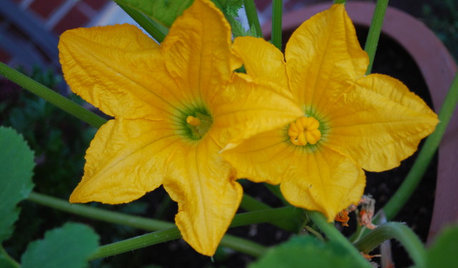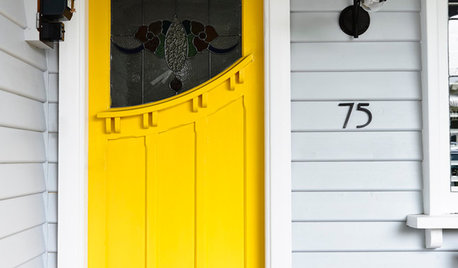maize
pnbrown
16 years ago
Related Stories

HOUZZ TOURSMy Houzz: Collective Spirit in a Boho Bungalow
Ethnic textiles, vintage furniture and vignettes galore show a Dallas stylist's hunter-gatherer side at its best
Full Story
DECORATING GUIDESRooster Decorating Worth Crowing About
Put the kibosh on kitsch with these ideas for strutting your rooster-motif stuff in moderation
Full Story
DECORATING GUIDESClassic Color Duo: Blue and White
For rooms that exude simplicity and elegance, consider the timeless color combination of blue and white in your interior design
Full Story
EDIBLE GARDENSSummer Crops: How to Grow Squash
Almost foolproof and with cheerful flowers, squash comes in a wide range of varieties to plant in spring
Full Story
COLORSay Hello to Minion Yellow, Pantone’s Newest (and Happiest) Color
This Hollywood-inspired shade is anything but despicable. Here’s how to work the cheerful and cheeky color into your home
Full Story
SHOP HOUZZShop Houzz: How to Decorate With Color Complements
Take cues from the color wheel to decorate your space
Full Story
GREENMint Green Is Fresh Again
Interior designers are rediscovering a taste for this cool hue, in vintage and modern looks alike
Full Story
CURB APPEALFront and Center Color: When to Paint Your Door Yellow
Bring a burst of eternal sunshine to your home's entryway with an invigorating yellow front door
Full Story
COLORBest Ways to Use the Soft Yellow Color of 2014
You may fall for PPG Pittsburgh Paints’ Turning Oakleaf if you like your hues warm, mellow and cheery
Full StoryMore Discussions





Pond
shrubs_n_bulbs
Related Discussions
13 ft Jala maize and growing
Q
20+ feet tall Jala Maize
Q
23 feet tall Montanas Maize
Q
20 feet tall Olotillo Maize
Q
flora_uk
pineresin
pnbrownOriginal Author
ornata
garden_nerd
pineresin
shrubs_n_bulbs
pnbrownOriginal Author
pineresin
gardening_sister
jonbaum
pnbrownOriginal Author
flora_uk
pnbrownOriginal Author
cajary
pnbrownOriginal Author
pineresin
pnbrownOriginal Author
flora_uk
pnbrownOriginal Author
flora_uk
cajary
pnbrownOriginal Author
pnbrownOriginal Author